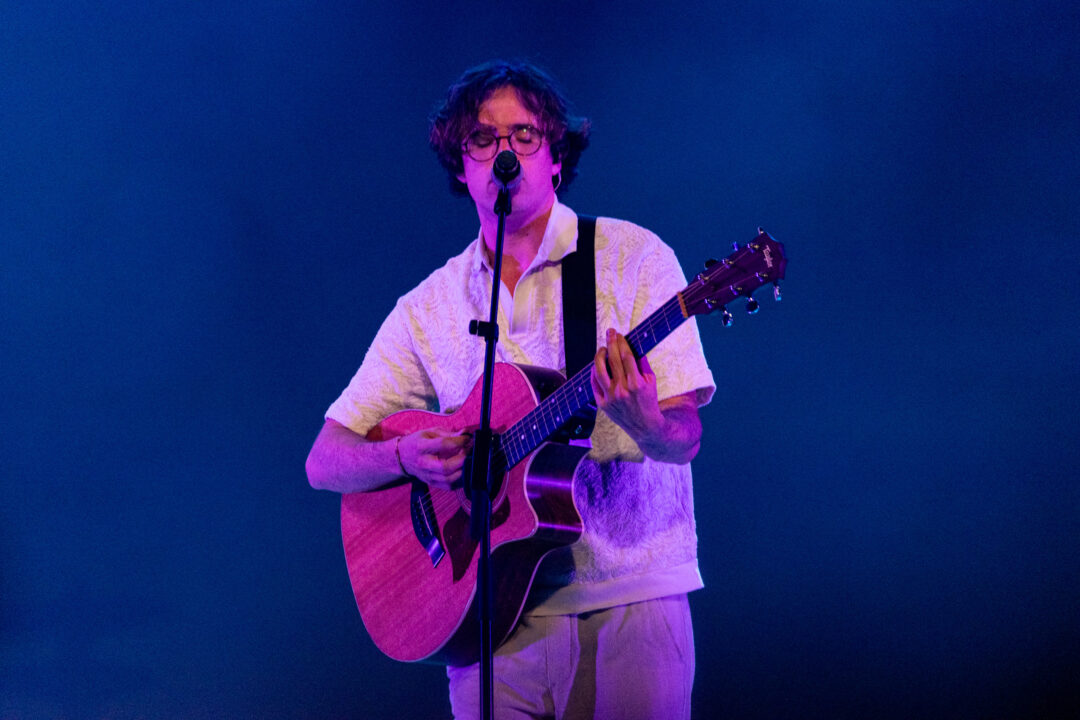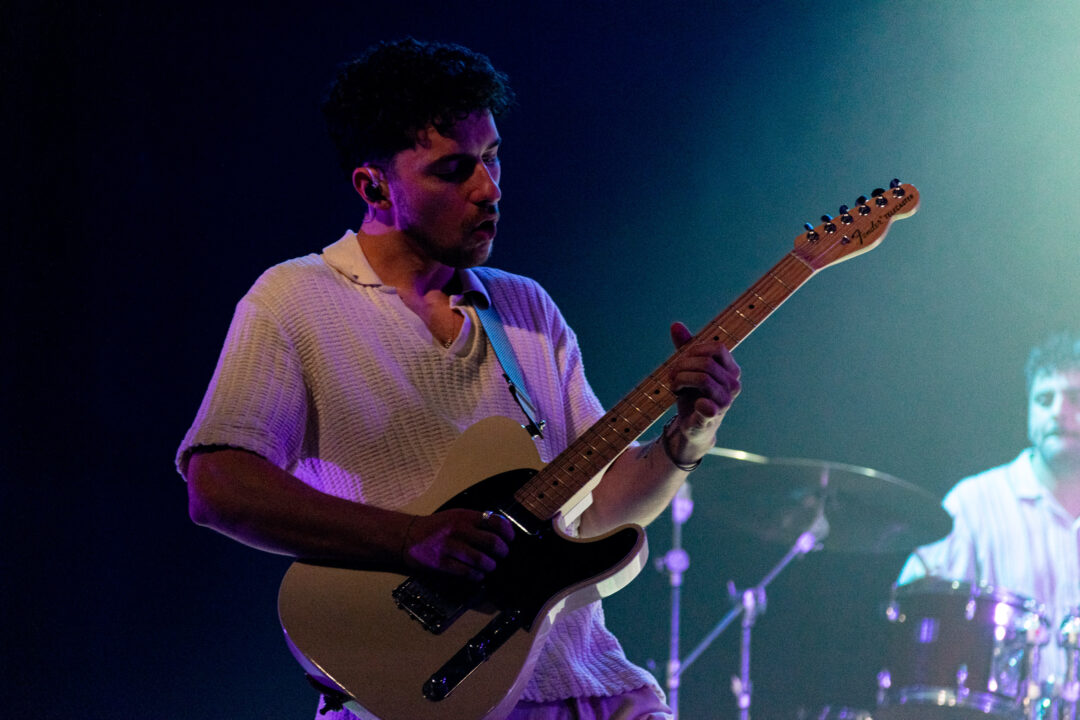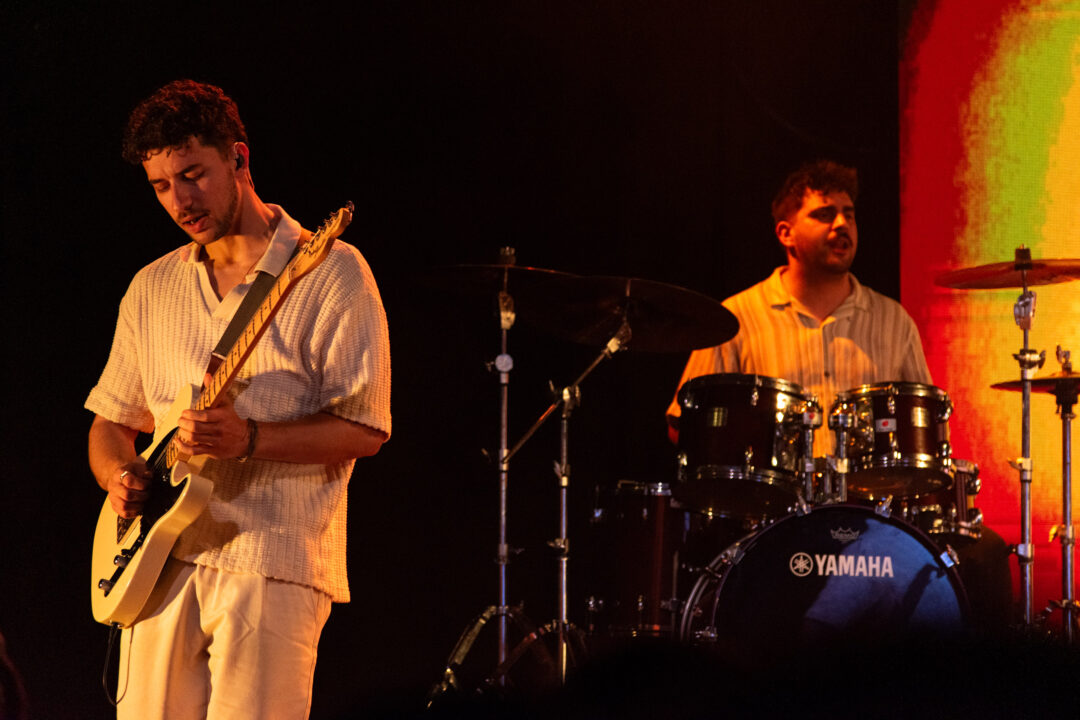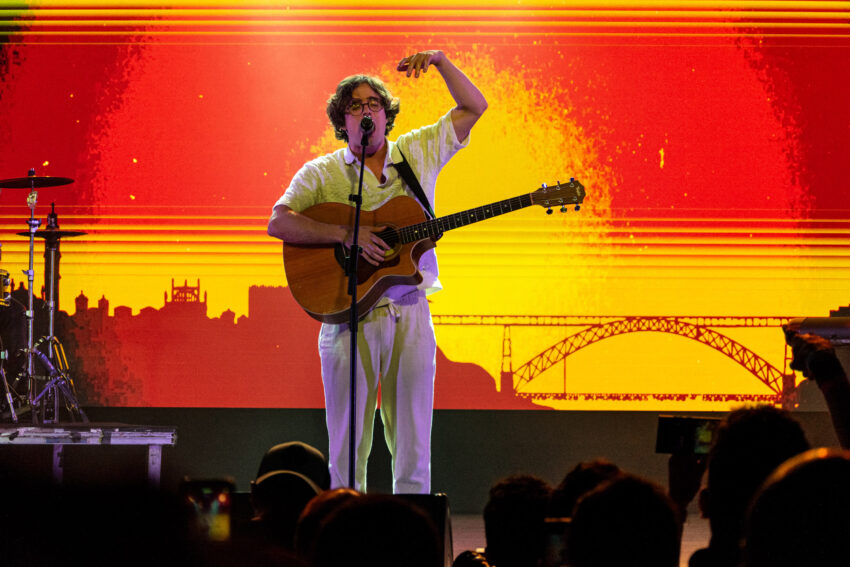Portugal has chosen its act for Eurovision 2025: the alternative rock band NAPA, born on the island of Madeira, who captivated Portuguese audiences with their heartfelt and authentic sound. After claiming victory at Festival da Canção 2025, the group is set to bring their emotional entry “Deslocado” to the Eurovision stage in Basel, Switzerland.
With a unique blend of alternative rock and Portuguese musical influences, NAPA’s journey has taken them from a basement rehearsal space to the spotlight of the European stage. Their song delivers a powerful message of nostalgia, belonging, and the longing for home, wrapped in a melancholic yet uplifting soundscape.
Meet NAPA: The Story Behind Portugal’s Eurovision Band
NAPA is the new name of the band formerly known as Men On The Couch, but their passion and essence remain the same. The group consists of:
- Francisco Sousa – guitar
- João Guilherme Gomes – vocals, guitar
- João Rodrigues – drums
- Diogo Góis – bass
- João Lourenço Gomes – piano
Their story began in a basement in Madeira, where five friends bonded over music. Their sound was shaped by influences from Arctic Monkeys, Red Hot Chili Peppers, the melodies of The Beatles, and the sensitivity of Caetano Veloso and Tom Jobim. Thanks to YouTube, their songs reached unexpected audiences both inside and outside the island. Eventually, they decided to switch from English to their native Portuguese, trading their grandmother’s basement for a professional studio.
In 2019, they released their debut album “Senso Comum”, delivering catchy melodies with a raw and melancholic spirit that resonated with Portuguese listeners. Their 2023 album “Logo Se Vê” showcased a more mature and experimental sound, pushing their creative boundaries while staying true to their roots.
The year 2024 marked a turning point for NAPA, as they embarked on their first national tour, selling out venues across Portugal’s main clubs, theaters, and festivals. Their latest productions are helmed by GOIAS, known for their work on “Afro Fado” by Slow J.



“Deslocado”: NAPA’s Song for Eurovision 2025
“Deslocado” was written by the members of NAPA along with André Santos. The song explores themes of displacement, homesickness, and the deep connection to one’s homeland, specifically the island of Madeira. Through poetic lyrics, it tells the story of someone who left their hometown and counts the days until they can return. The imagery of a “packed suitcase” symbolizes memories and the yearning to go back.
The chorus, with its emotional refrain “Que eu ‘tou a chegar a casa” (I’m coming home), repeats like a hopeful mantra, making each repetition feel closer to reality. The song contrasts the protagonist’s bustling new city life with their longing for the peace of home, describing the modern urban landscape as “a sea of people” and “a mountain of concrete”, yet never feeling truly at home.
“Deslocado” paints Madeira as a spiritual sanctuary—“ilha, paz” (island, peace)—and despite the loneliness and sorrow of leaving, the song ends with hope: the possibility of return, where family and home await with open arms.
“Deslocado” Lyrics: Original Portuguese and English Translation
Looking for the lyrics to “Deslocado” by NAPA? Below you’ll find the original Portuguese lyrics side by side with their English translation, so you can sing along or understand the heartfelt message behind Portugal’s Eurovision 2025 entry.
The song’s lyrics convey longing, nostalgia, and the hope of returning home—making “Deslocado” one of the most emotional entries of this year’s contest.
Portuguese
Conto os dias para mim
Com a mala arrumada
Já quase não cabia a saudade acumulada
Do azul vejo o jardim
Mesmo por trás da asa
Mãe olha à janela que eu tou a chegar a casa
Que eu tou a chegar a casa
Que eu tou a chegar a casa
Que eu tou a chegar a casa
Por mais que possa parecer
Eu nunca vou pertencer àquela cidade
O mar de gente, o sol diferente
O monte de betão não me provoca nada
Não me convoca casa
Porque eu
Vim de longe
Eu vim do meio do mar, no coração
Do oceano eu tenho a vida inteira
O meu caminho eu faço a pensar em regressar
À minha casa, ilha, paz, Madeira
Se eu te explicar palavra a palavra
Nunca vais entender a dor que me cala
A solidão que assombra a hora da partida
Carrego o sossego de poder voltar
Mãe olha à janela que eu tou a chegar
Por mais que possa parecer
Eu nunca vou pertencer àquela cidade
O mar de gente, o sol diferente
O monte de betão não me provoca nada
Não me convoooooo
O mar de gente, o sol diferente
O monte de betão não me provoca nada
Não me convoca casa
English
I’m counting down the days
With my suitcase packed
All my built-up saudade could hardly fit
I can see the garden from the blue
Just behind the wing
Mom, look out the window, I’m coming home
I’m coming home
I’m coming home
I’m coming home
No matter how it may seem
I’ll never belong to that city
The sea of people, the different sun
The concrete hills don’t stir anything in me
They don’t feel like home
Because I
I came from far away
I came from the middle of the sea, in the heart
Of the ocean I have my whole life
I make my way thinking of returning
To my home, island, peace, Madeira
If I explain it to you word by word
You’ll never understand the pain that silences me
The loneliness that haunts the moment of departure
I take solace in being able to return
Mom, look out the window, I’m coming
No matter how it may seem
I’ll never belong to that city
The sea of people, the different sun
The concrete hills don’t stir anything in me
They don’t feel like hoooooome
The sea of people, the different sun
The concrete hills don’t stir anything in me
They don’t feel like home
Portugal at Eurovision: A Brief History
Portugal made its Eurovision debut in 1964 with António Calvário and “Oração”, which sadly finished with zero points. Since then, Portugal has competed in nearly every edition, reaching its historic first victory in 2017 with Salvador Sobral and the iconic “Amar pelos dois”, scoring a record-breaking 758 points.
Throughout the years, Portugal’s Eurovision journey has seen highs and lows, including absences in 1970, 2000, 2002, 2013, and 2016, the latter two due to financial issues at the national broadcaster. In 2018, following their victory, Portugal hosted Eurovision in Lisbon, represented by Cláudia Pascoal with “O Jardim”, finishing last in the grand final.
More recently, Mimicat represented Portugal in 2023 with “Ai Coração”, finishing 23rd in the grand final. In 2024, iolanda won Festival da Canção with “Grito”, securing 10th place in the Eurovision final with 152 points, placing 7th in the jury vote with 139 points.

